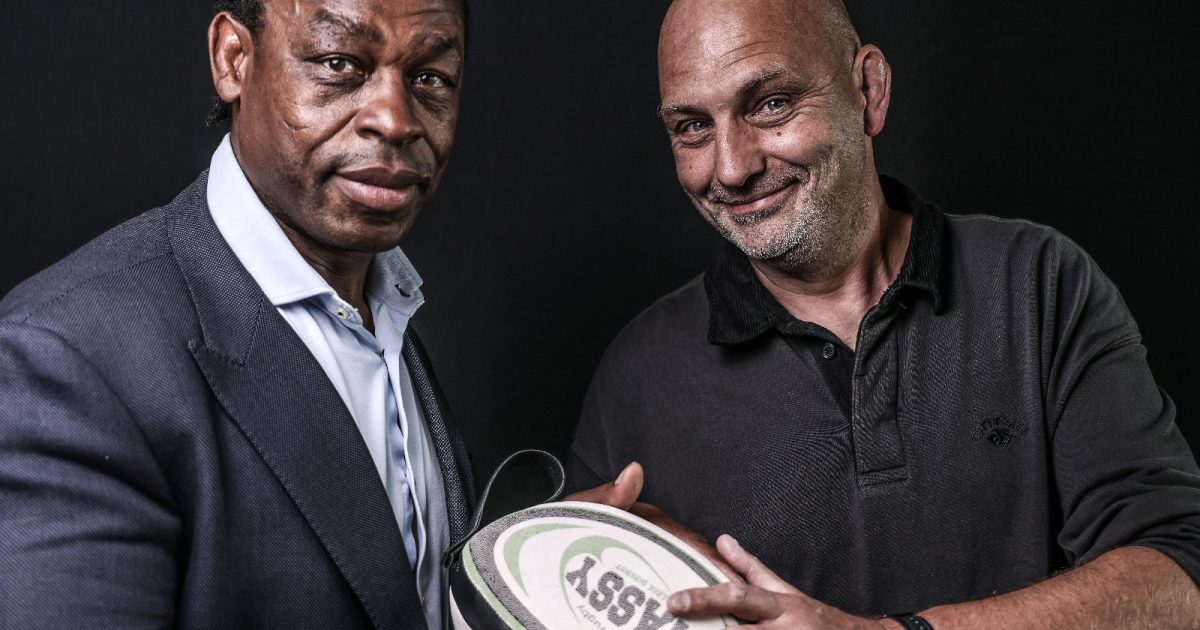Serge Betsen recycle les ballons de rugby pour la bonne cause

Serge Betsen, qui a fêté son demi-siècle en mars, se souvient très bien du petit garçon qu’il était lorsqu’à douze ans il a découvert le rugby. Le petit Camerounais était arrivé à Clichy-la-Garenne avec sa mère et ses six frères et sœurs depuis trois ans déjà. « On n’avait pas beaucoup d’argent et on ne se plaignait pas. On avait assez pour vivre », raconte-t-il à RugbyPass.
« Ma mère m’a beaucoup parlé de respect, de travail, de discipline, de rigueur. C’est ces mots-là que j’ai découvert avec le rugby. Le rugby m’a fait découvrir que j’aimais participer au collectif. »
« Au premier entraînement, j’ai appris le plaquage. Il n’y a pas de meilleure façon d’entrer dans un sport et de découvrir un skills qui correspond à sa personnalité. C’est à travers ces moments-là que je me suis construit et aujourd’hui je mets cette expérience au service des autres. »
Des actions au Cameroun et au Mali
Il y a 20 ans, il fondait la Serge Betsen Academy pour apporter du « mieux vivre » au Cameroun, et depuis 2020 au Mali.
Son nouveau projet autour du recyclage des ballons de rugby s’inscrit parfaitement dans ce schéma tourné vers l’autre. La mission de Ballon Responsable est claire : ne plus jeter aucun ballon de rugby.
« Chaque année dans le monde la production et la destruction de ballons de rugby représente 1,2 million de kilogrammes de déchets ! C’est énorme. Les ballons sont jetés et polluent notre environnement », s’étonne encore l’ancien troisième-ligne international (63 sélections) que l’on surnommait « la faucheuse » avant qu’il ne mette un terme à sa carrière en 2012.
« Ce ballon qui est un élément important dans notre sport, il faut en prendre soin et en faire quelque chose d’utile ».
« Chaque année dans le monde, la production et la destruction de ballons de rugby représente 1,2 million de kilogrammes de déchets ! »
« Souvent les gens pensent que c’est du cuir, mais un ballon de rugby est fait de plastique qui ne se recycle pas. Il y a pleins d’éléments à l’intérieur qui servent à étudier les performances, la data, la vitesse… Or, qu’est-ce qu’on en fait après ? Aujourd’hui, on se positionne en tant qu’entité qui va essayer – tout en étant passionnés par notre sport – de protéger ce dernier tout en préservant la planète. »
Collecte auprès des clubs
Avec Lionel Quenardel, un ami d’enfance, Serge Betsen a commencé par créer une association en 2016 – Recycling Rugby – pour réemployer les ballons de rugby usés ou défectueux. Devant l’ampleur de la tâche et le succès de cette dernière qui ne vit que grâce au bénévolat, ils ont souhaité se professionnaliser et Le Ballon Responsable est né il y a seulement quelques semaines.
La collecte des ballons se fait avec un partenaire, Ecologic pour récupérer auprès des clubs, des distributeurs et des fabricants des ballons destinés à la déchetterie.
Les ballons sont rapatriés en région parisienne et confiés dans un premier temps à un ESAT (structure qui permet aux personnes en situation de handicap d’exercer une activité professionnelle) pour être lavés et découpés avant d’être livrés non loin de là près de Massy chez un maroquinier qui les transforme en accessoire de maroquinerie : sac, portefeuille, trousses…
Le produit des ventes est destiné à des associations caritatives
Les produits sont ensuite vendus lors d’évènements ou sur le site internet de la société. Si au début les fonds étaient destinés à la Serge Betsen Academy pour ses actions à travers le monde, désormais une partie des fonds obtenus est reversée à des associations caritatives, ce qui permet d’envisager à terme le statut d’entreprise à mission.
« A partir du moment où l’on produit des déchets, il est important, et même vital, de mettre en place des actions de recyclage de ces derniers, pour amoindrir les impacts néfastes pour notre planète », insiste Serge Betsen qui souhaite sensibiliser la communauté du rugby à cet enjeu environnemental.
« Les enjeux sociétaux, en termes de recyclage de matériel lié au rugby sont encore nombreux, nous devons arriver à moins produire et à plus ré-utiliser les matériaux spécifiques à l’activité (maillot, crampons, tenue, ballon…). Et nous avons de nombreux projets dans ce sens… »
Cette nouvelle aventure ne fait que commencer.























































